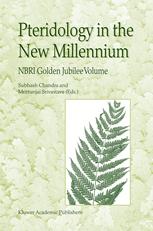

Most ebook files are in PDF format, so you can easily read them using various software such as Foxit Reader or directly on the Google Chrome browser.
Some ebook files are released by publishers in other formats such as .awz, .mobi, .epub, .fb2, etc. You may need to install specific software to read these formats on mobile/PC, such as Calibre.
Please read the tutorial at this link: https://ebookbell.com/faq
We offer FREE conversion to the popular formats you request; however, this may take some time. Therefore, right after payment, please email us, and we will try to provide the service as quickly as possible.
For some exceptional file formats or broken links (if any), please refrain from opening any disputes. Instead, email us first, and we will try to assist within a maximum of 6 hours.
EbookBell Team

0.0
0 reviewsThe National Botanical Research Institute came into being as the 13th among a chain of National Laboratories established during April, 1953 under the Council of Scientific and Industrial Research by the Govt. of India for advanced research in fields of specialisation which have a direct bearing on socio-economic, industrial and scientific advancement of the nation. Christened initially as National Botanic Gardens, the nucleus around which the institution took shape under its founder- Director Late Prof. K. N. Kaul, was a large herbarium of Indian flora and a centu- old botanical garden spread over 35 ha of land on the banks of River Gomti in the heart of Lucknow city. It’s a matter of great pleasure and profound satisfaction to me that a Golden Jubilee volume entitled, “Pteridology in the New Millennium” is being published and released during the Golden Jubilee year of NBRI in the honour of Professor B. K. Nayar who laid the foundation of the Pteridology Laboratory of the NBRI, which is now a well equipped laboratory for the study of Indian pteridophytes. Professor Nayar is a holistic Botanist as evident through his contributions and publications in almost all the areas of study of Pteridophyta. The contribution of Professor Nayar towards the development of modern Pteridology and the role of NBRI in it is indeed great and very important. His publications will be valuable for the younger generation of scientists in the field as well as for the more mature research workers and teachers.